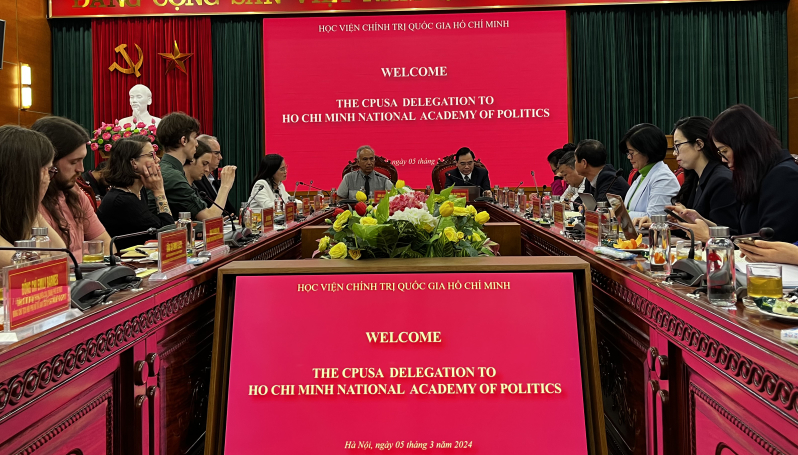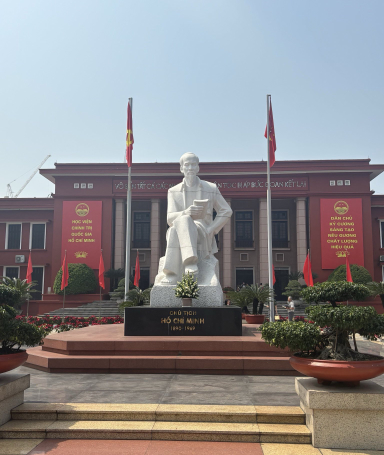
The Communist Party of Vietnam (CPV) continues to strive towards socialism. I have heard many people in my community ask me “how are they still socialist?” or “I thought they gave that up in the 90’s?” I honestly had similar questions and was presented with the opportunity to find out much more via the Communist Party USA’s (CPUSA) Hello Comrade Project.
I had the privilege to be selected as a representative from the Southeast for the Hello Comrade Project’s (HCP) trip to Vietnam. HCP organizes international educational and friendship delegations to CPUSA’s fraternal parties. During the trip we were invited to meet with professors from the Ho Chi Minh National Academy of Politics who graciously presented on a wide variety of subjects about socialism. These ranged from historical analysis, political economy, Ho Chi Minh thought, morality, style, international relations, and party building. The presentation on building up the party is of utmost importance, both for the CPV, but also for those of us here in the U.S.
They presented to us five facets of building the party: politics, ideology, morality, organization, and personnel. Politics for them is all about party leadership, how cadres in the party can find, build, and lead the way through the party program. They also must continue to build up the party’s reputation. It can be seen that one way that the CPV has continued on its path to socialism is that they emphasize their reputation among the people. They try to think through their program and get feedback from the people. Some lessons that we can draw upon are having leaders in the party who can demonstrate to general members and the U.S. public that we are legitimate. We must find ways to show that our program, analysis, and actions are correct. To have a reputation among the masses, the party must be a part of the masses’ struggles.
 For ideology, the professors present emphasized the pursuit of following Marxism-Leninism and Ho Chi Minh Thought. This pursuit should promote trust in the ideology among party members. It can be seen that if party members have no trust in the ideology of the party there will be no party. One lesson for us in the U.S. to take away is that our party members must be educated in our ideology. We must learn not only from the great theorists of Marx and company, but of those who have lived, worked, studied, and organized here in the US. Some examples could be Claudia Jones, Henry Winston, and William Z. Foster. We must have members who believe in the cause and have systems in place for those that are new to learn as much as they can.
For ideology, the professors present emphasized the pursuit of following Marxism-Leninism and Ho Chi Minh Thought. This pursuit should promote trust in the ideology among party members. It can be seen that if party members have no trust in the ideology of the party there will be no party. One lesson for us in the U.S. to take away is that our party members must be educated in our ideology. We must learn not only from the great theorists of Marx and company, but of those who have lived, worked, studied, and organized here in the US. Some examples could be Claudia Jones, Henry Winston, and William Z. Foster. We must have members who believe in the cause and have systems in place for those that are new to learn as much as they can.
The next facet we were presented with was morality. For party building in the CPV, they are most concerned with standards of how to be a virtuous communist in this period. The biggest piece of morality that they emphasized is discipline. To be a legitimate party, members must be disciplined when it comes to party rules and laws. The recent anti-corruption campaigns are indicative of this particular facet. A lesson to be gained for U.S. comrades is to be disciplined in life. It is especially debilitating to the party to have members act directly against party rules.
Next was working to improve the organization of the entire political system. They presented five main principles of organization which were democratic centralism, criticism and self criticism, a close bond between the party and the people, and the party framework of law. These principles are key to having an organized party and organized members within the party. The lessons to be gleaned here are for any communist party to be successful, the party as a whole and those within must be organized. There must be a plurality of thought and unity of action. There must be an assessment of all that is done in the party. A party that is disconnected from the people is but a party by name. As for the last principle, a party should find its place within the current constitution and law.
The final facet was personnel and building personnel at a strategic level. They continue to build a pool of committed cadres who dare to think, speak and act, who dare to uphold responsibility, creativity, and innovation, who dare to be bold in carrying out party guidelines. This personnel building happens from the grassroots level all the way up to upper leadership. Another aspect of personnel is for party members to be loyal and act in solidarity with the international community. The CPV sees great importance in solidarity with workers parties around the world as a key part of Party building.
In conclusion, party building is a fundamental aspect of Vietnam’s path to socialism under CPV leadership. The interconnected facets of politics, ideology, morality, organization, and personnel offer valuable lessons for communist parties worldwide. By learning from the CPV’s experiences, we can strengthen our own efforts in building a successful party.
Images: All images special to CPUSA.org.


 Join Now
Join Now